Highlights of a Forum: Data and Analytics Innovation: Emerging Opportunities and Challenges
Highlights
What the Participants Said
Forum discussions considered the implications of new data-related technologies and developments that are revolutionizing the basic three-step innovation process in the figure below. As massive amounts of varied data become available in many fields, data generation (step 1 in the process) is transformed. Continuing technological advances are bringing more powerful analytics and changing analysis possibilities (step 2 in the process). And approaches to new decision making include intelligent machines that may, for example, guide human decision makers. Additionally, data may be automatically generated on actions taken in response to data analytic results, creating an evaluative feedback loop.
A Twenty-first Century Cycle: Data and Analytics Innovation

- saw the newly revolutionized and still-evolving process of data and analytics innovation (DAI) as generating far-reaching new economic opportunities, including a new Industrial Revolution based on combining data-transmitting cyber systems and physical systems, resulting in cyber-physical systems—which have alternatively been termed the Industrial Internet, also the Internet of Things;
- warned of an ongoing and potentially widening mismatch between the kinds of jobs that are or will be available and the skill levels of the U.S. labor force;
- identified beneficial DAI impacts that could help efforts to reach key societal goals—through defining DAI pathways to greater efficiency and effectiveness—in areas such as health care, transportation, financial markets, and “smart cities,” among others; and
- outlined areas of data-privacy concern, including for example, possible threats to personal autonomy, which could occur as data on individual persons are collected and used without their knowledge or against their will.
The overall goal of the forum's discussions and of this report is to help lay the groundwork for future efforts to maximize DAI benefits and minimize potential drawbacks. As such, the forum was not directed toward identifying a specific set of policies relevant to DAI. However, participants suggested that efforts to help realize the promise of DAI opportunities would be directed toward improving data access, assessing the validity of new data and models, creating a welcoming DAI ecosystem, and more generally, raising awareness of DAI’s potential among both policymakers and the general public. Participants also noted a likely need for higher U.S. educational achievement and a measured approach to privacy issues that recognizes both their import and their complexity.
Why GAO Convened This Forum
Massive volumes of data are increasingly being generated at unprecedented rates as a result of advances in information technology and developments such as use of expanded mobile capabilities (supported by more powerful and increasingly widespread bandwidth). New approaches to combining and “making sense of” large amounts of varied data—methods referred to as advanced analytics—are helping to uncover patterns, identify anomalies, and provide insights not suggested by a priori hypotheses. In fact, advanced algorithms are enabling the automation of functions that require the ability to reason; for example, an algorithm may use data on weather, traffic, and roadways to estimate and provide real-time information to drivers on traffic delays and congestion.
At the January 2016 forum, participants from industry, government, academia and nonprofit organizations considered potential implications of these developments. Their discussion of emerging forms of data, analytics, and innovation pointed to a combined process or cycle in which relevant data are generated and subjected to analysis, so that results can be applied to innovative\ decision making or uses. We term this process “data and analytics innovation.” Consideration of related impacts spanned the economy and society, and included new opportunities with accompanying challenges, as well as potentially negative impacts. Following the forum, participants reviewed a summary of forum discussions, and two experts (who did not attend the forum) independently reviewed a draft of this report. The report does not necessarily represent the views of any individual participant or organization.
For more information, contact Timothy Persons, Chief Scientist, at (202) 512-6412 or personst@gao.gov.
